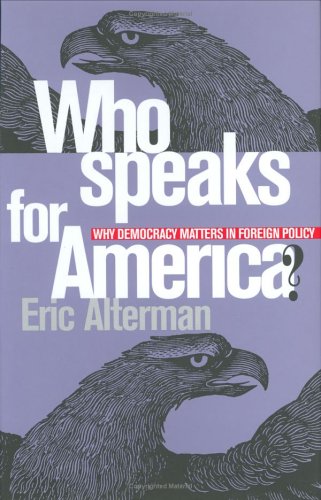Items related to Who Speaks for America?: Why Democracy Matters in Foreign...

Experts have long insisted that the public is too ignorant to contribute to the creation of successful foreign policy. But over the course of two hundred years, as Alterman makes clear, the American people have shown an impressive consistency in their ideals and values. The problem for any elite, the author explains, is that Americans often define their interests quite differently than those who would speak in their name. The American public's values are, ironically, much closer to the "liberal republican" philosophy of our founders than to those of our most powerful elites. Alterman concludes with a series of challenging proposals for reforms designed to create a truly democratic U.S. foreign policy.
"synopsis" may belong to another edition of this title.
"The public's values," writes Alterman in Who Speaks for America?, "are a good deal closer to the liberal republican values of the country's original founders than are those of the establishment that professes to represent them. The problem is not that the public does not care. Rather, it has no idea how to force the government to respond to its preferences." The preferences Alterman indicates are based on a wide range of public-opinion polls that demonstrate the sharp dichotomy between what citizens consider important and worthwhile and what lawmakers, self-appointed experts, corporate lobbyists, and other elitists comprising the "punditocracy" actually put into practice as foreign policy. For instance, polls reveal that the public attitude toward the United Nations is overwhelmingly favorable; that nearly all forms of covert governmental action conducted abroad are viewed as inexcusable; that there is strong public opposition to the size and scope of U.S. arms sales across the globe; and protecting the environment is given a higher priority than insuring adequate energy supplies. All of these opinions are inconsistent with current American foreign policy, yet voters are unable (or, some would argue, unwilling) to exert any meaningful and sustained influence over the manner in which the government interacts with the world.
According to Alterman, the primary reason for a lack of public access to this process is the attitude historically held by leaders that the public is ill-equipped to make decisions concerning foreign affairs. "How, then," he asks, "can the United States claim to be a functioning democracy when one of the most crucial aspects of public policy allows for almost no democratic participation?" The short answer is that it can't, so Alterman offers an "immodest proposal" for overhauling the current system--though immodest is putting it lightly. He should be credited for highlighting a significant problem in this informed and important book, but it must be noted that his solutions are so sweeping, and the implications so vast, that actually activating them would require restructuring the electoral process and creating new institutions from the ground up--a radical idea with a familiar ring. --Shawn Carkonen
Copyright 1998 Reed Business Information, Inc.
"About this title" may belong to another edition of this title.
- PublisherCornell University Press
- Publication date1998
- ISBN 10 0801435749
- ISBN 13 9780801435744
- BindingHardcover
- Edition number1
- Number of pages244
Buy New
Learn more about this copy
Shipping:
FREE
Within U.S.A.
Top Search Results from the AbeBooks Marketplace
Who Speaks for America?: Why Democracy Matters in Foreign Policy
Book Description Hardcover. Condition: New. Seller Inventory # Abebooks226975
WHO SPEAKS FOR AMERICA?: WHY DEM
Book Description Condition: New. New. In shrink wrap. Looks like an interesting title! 1.08. Seller Inventory # Q-0801435749

